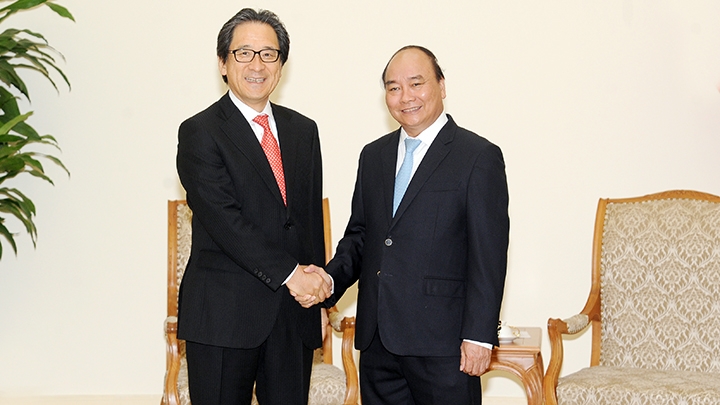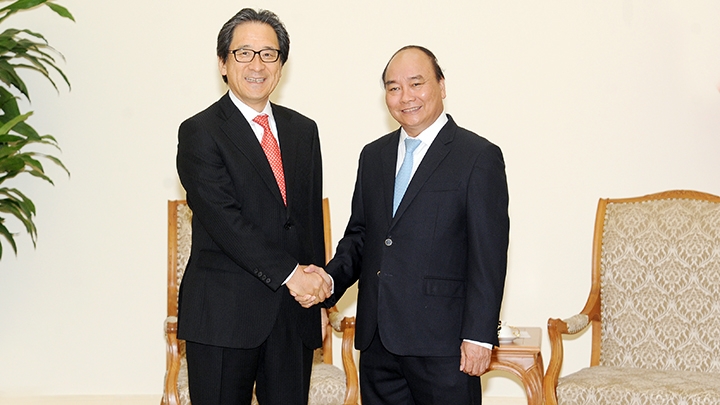
Japanese enterprises in Vietnam are looking to employ a large number of high-quality staff, revealed Hiroyuki Ishige, Chairman and CEO of the Japan External Trade Organisation (JETRO).
PM Nguyen Xuan Phuc (R) and
Hiroyuki Ishige, Chairman and CEO of the Japan External Trade Organisation
(Photo: VNA)
He shared the information during a
reception with Prime Minister Nguyen Xuan Phuc in Hanoi on July 19.
At the meeting, PM Phuc lauded JETRO’s activities in Vietnam and said he
believes that his guest’s current visit to Vietnam will open a new chapter for
trade and investment cooperation between the two nations.
The PM thanked the collaboration of JETRO in organising a trade promotion
conference in Vietnam during his official visit to Japan in June 2017. This was
the largest event of its kind to date, attracting the attendance of over 1,600
delegates, including the Vietnamese and Japanese Prime Ministers.
He affirmed that business climate improvement is a priority of the Vietnamese
Government. The country is focusing on stabilising macroeconomics, improving
legal institutions, developing infrastructure and human resources, and
simplifying administrative procedures.
PM Phuc said recent surveys showed a significant number of Japanese firms spoke
highly of Vietnam’s business climate and wanted to expand their operations in
the country.
The Vietnamese leader expected Japan would obtain the top position in Vietnam’s
FDI, saying Vietnam welcomes Japanese investments, particularly in
infrastructure development, clean energy, processing and industry, electronics,
high-tech farming, logistics, and aviation.
He stated that Vietnam will do its best to facilitate Japanese investors.
The PM took the occasion to convey his sympathies to Japanese people affected
by recent floods.
For his part, JETRO Chairman and CEO Hiroyuki Ishige said Japanese PM Shinzo
Abe pays attention to on boosting cooperation with Vietnam.
Ishige highlighted that the many deals secured at the June conference –
including key projects in energy, trade, and industrial production – are
effectively being implemented in Vietnam.
Highlighting the strong Japanese capital flow into Vietnam, he said JETRO is
making efforts to support the investments.
He said skilled Vietnamese employees are in high demand for Japanese firms,
adding that JETRO is working with Vietnamese universities to introduce Japanese
firms.
He stressed that improvements to the business climate are key to attracting
more Japanese investors to Vietnam.
Responding to PM Phuc’s comment on the proactive contribution of Vietnam and
Japan to the Comprehensive and Progressive Agreement for Trans-Pacific
Partnership (CPTPP), Ishige said he expects the two countries will take the
lead in the implementation of the pact.
He hoped the CPTPP’s coming into effect would happen soon, so as to bring about
the mutual benefits for all sides involved.
Source: VNA
According to data from the Hoa Binh Provincial Party Committee, the industrial production index for the first six months of 2025 is estimated to have increased by 20% compared to the same period last year. This marks the highest year-on-year growth rate for this period since 2020.
In the first six months of 2025, Hoa Binh province’s export turnover was estimated at 1.145 billion USD, marking an 18.11% increase compared to the same period in 2024. Import turnover was estimated at $ 804 million, a 17.15% increase, which helped the province maintain a positive trade balance.
The lives of the ethnic minority farmers in Tan Lac district have gradually improved thanks to the new directions in agricultural production. This is a testament to the collective strength fostered through the professional associations and groups implemented by various levels of the district’s Farmers’ Union.
With the motto the "product quality comes first,” after nearly one year of establishment and operation, Muong village’s Clean Food Agricultural and Commercial Cooperative, located in Cau Hamlet, Hung Son Commune (Kim Boi district), has launched reputable, high-quality agricultural products to the market that are well-received by consumers. The products such as Muong village’s pork sausage, salt-cured chicken, and salt-cured pork hocks have gradually carved out a place in the market and they are on the path to obtaining the OCOP certification.
In the past, the phrase "bumper harvest, rock-bottom prices" was a familiar refrain for Vietnamese farmers engaged in fragmented, small-scale agriculture. But today, a new spirit is emerging across rural areas of Hoa Binh province - one of collaboration, organisation, and collective economic models that provide a stable foundation for production.
Maintaining growing area codes and packing facility codes in accordance with regulations is a mandatory requirement for agricultural products to be eligible for export. Recently, the Department of Agriculture and Environment of Hoa Binh province has intensified technical supervision of designated farming areas and packing facilities to safeguard the "green passport" that enables its products to access international markets.



